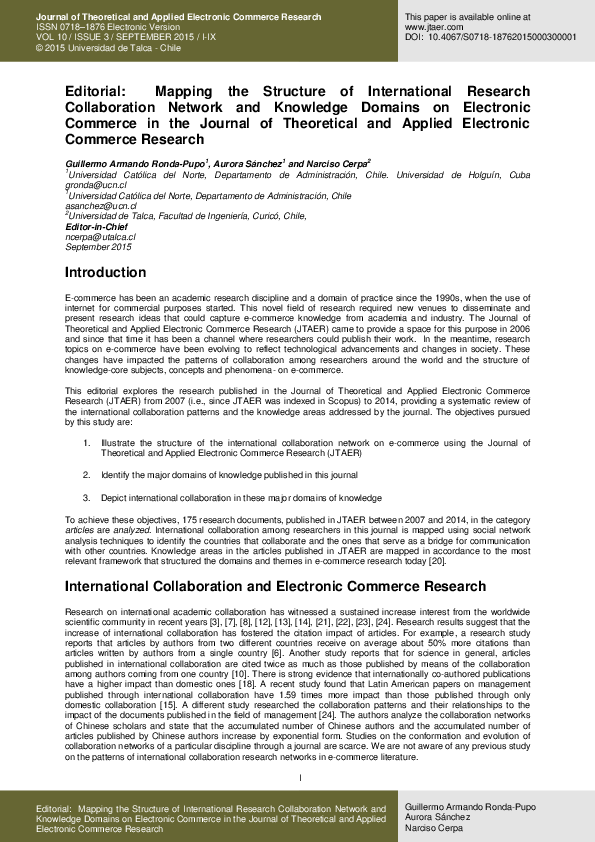技术驱动的生态系统中的价值创造:合作在工业网络中的作用
IF 4.6
3区 管理学
Q1 BUSINESS
Journal of Theoretical and Applied Electronic Commerce Research
Pub Date : 2024-09-07
DOI:10.3390/jtaer19030113
引用次数: 0
摘要
合作竞争虽然具有显著的战略优势,但在维持竞争者之间的长期合作方面却面临挑战,原因往往是参与方缺乏感知价值。本研究运用服务主导逻辑(S-D Logic)框架,探讨技术在克服这些挑战中的作用,研究技术驱动型网络如何增强中小型企业(SMEs)之间的价值共创。研究假设,过渡到技术驱动的合作竞争网络可以大幅提高价值共创。为了验证这一假设,研究对现有的合作竞争理论方法进行了批判性评估,找出了在理解价值创造机制方面存在的差距,并利用物联网(IoT)技术实施了一个实验性的技术驱动合作竞争网络。研究设计明确应用于葡萄牙的观赏石产业,这是一个重要的经济和文化领域。研究结果证实,技术驱动的合作竞争网络可以加强价值共创,提高产出。这些结果表明,将技术融入合作竞争框架可以为中小企业维持竞争优势提供一条可行之路。本文章由计算机程序翻译,如有差异,请以英文原文为准。
Value Creation in Technology-Driven Ecosystems: Role of Coopetition in Industrial Networks
Coopetition, while offering significant strategic advantages, presents challenges in maintaining long-term collaboration among competitors, often due to a lack of perceived value for the participating actors. This study explores the role of technology in overcoming these challenges by applying the Service-Dominant Logic (S-D Logic) framework to investigate how technology-driven networks can enhance value co-creation among small and medium-sized enterprises (SMEs). The study hypothesizes that transitioning to technology-driven coopetition networks can substantially improve value co-creation. To test this hypothesis, the research critically evaluates existing theoretical approaches to coopetition, identifies gaps in understanding value creation mechanisms, and implements an experimental technology-driven coopetition network leveraging Internet of Things (IoT) technology. The research design is applied explicitly to the Portuguese ornamental stone industry, a significant economic and cultural sector. The findings confirm that technology-driven coopetition networks can enhance value co-creation and improve outputs. These results suggest that integrating technology into coopetition frameworks can provide a viable path to sustaining competitive advantages in SMEs.
求助全文
通过发布文献求助,成功后即可免费获取论文全文。
去求助
来源期刊
CiteScore
9.50
自引率
3.60%
发文量
67
期刊介绍:
The Journal of Theoretical and Applied Electronic Commerce Research (JTAER) has been created to allow researchers, academicians and other professionals an agile and flexible channel of communication in which to share and debate new ideas and emerging technologies concerned with this rapidly evolving field. Business practices, social, cultural and legal concerns, personal privacy and security, communications technologies, mobile connectivity are among the important elements of electronic commerce and are becoming ever more relevant in everyday life. JTAER will assist in extending and improving the use of electronic commerce for the benefit of our society.

 求助内容:
求助内容: 应助结果提醒方式:
应助结果提醒方式:


